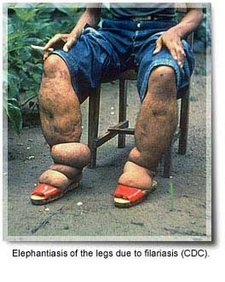Of all the exotic diseases that afflict people, elephantiasis ranks among the most dreaded. The threadlike, parasitic worm that causes this lethal disease makes nests in a person's lymph system. The result is fever, skin lesions, and swelling of the legs and genitalia. In rural Africa, where many cases occur, people with the disease are "unable to carry out their livelihood and are shunned by society," says Mark J. Taylor, a parasitologist at the Liverpool School of Tropical Medicine in England. Moreover, the worm, Wuchereria bancrofti, is impervious to most medications tested against it.
Taylor and his colleagues now report that a potent antibiotic called doxycycline can penetrate the worm's defenses by attacking Wolbachia, a bacterium that lives symbiotically inside the parasite. Their study appears in the June 18 Lancet.
Other researchers have used antibiotics against river blindness, which is also spread by a parasitic worm that depends on Wolbachia (SN: 6/17/00, p. 389). But it's still unclear how Wolbachia benefits these and other worms.
In the new study, Taylor's group took blood samples from dozens of men in a Tanzanian village and identified those who were carrying the worm's larvae. Ultrasound examinations of lymph vessels in those men's scrotums revealed which men also harbored active, adult worms. Not everyone harboring active worms showed overt elephantiasis symptoms, Taylor says, and an infection can linger for years or decades before becoming deadly.
The researchers randomly assigned some men infected with adult worms to take a doxycyeline capsule twice a day for 8 weeks and other men to get inert capsules. Ultrasound tests revealed that only 6 of the 27 men who had received the antibiotic still had live, detectable adult worms 14 months later, whereas 24 of 27 men getting the placebo did.
Blood tests showed that by 8 months after treatment, doxycycline had cleared the parasite's larvae from all but one of the men getting the drug. Later, three of the men were apparently reinfected. Mosquitoes spread the larvae between people.
Some oral drugs, such as ivermectin, can wipe out larvae and so stop the spread of elephantiasis, also called lymphatic filariasis. However, ivermectin doesn't kill adult worms, so it doesn't cure people with established disease, says Taylor.
Another drug, called diethylcarbamazine, can cure many cases, but it can't be used in many parts of Africa because it causes severe side effects in people harboring the parasite that causes river blindness, says James W. Kazura, a physician specializing in tropical medicine at Case Western Reserve University in Cleveland.
Because doxycycline works by a completely different mechanism than these drugs do, "it's a very promising lead for researchers," says Wilma A. Stolk, an epidemiologist at the Erasmus Medical Center in Rotterdam, the Netherlands.
Both Kazura and Stolk caution that while doxycycline might cure some individuals, it's unlikely to affect the overall spread of elephantiasis. In rural Africa, it would be a logistic nightmare to administer a large-scale program requiring an 8-week dose of drugs, Kazura says. Furthermore, doxycycline can't be given to young children or to pregnant women.
Taylor says that he's working on a drug formulation that could halve the 8-week regimen.
STATS 80 Number of countries in which elephantiasis occurs
COPYRIGHT 2005 Science Service, Inc.
COPYRIGHT 2005 Gale Group



